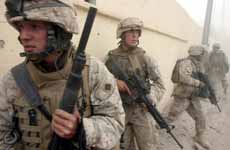|
Iraqis Reach Conciliatory Language on Pullout, Resistance
 |
|
Iraqi
Prime Minister Ibrahim Al-Jaafari, left, talks to Moussa, as Khaled
Al-Attiya, a member of the Iraqi National Assembly, watches.
|
CAIRO,
November 21, 2005 (IslamOnline.net & News Agencies) - Iraqi
leaders reached a tentative agreement Monday, November 21, on
demanding a timetable for the withdrawal of foreign troops from their
war-torn country, with a compromise language on resistance.
Dozens
of leaders representing most of Iraq's factions have been holding
tough talks in Cairo since Saturday, November 19, in a bid to reach a
common agenda.
In
a final statement, read by Arab League chief Amr Moussa, they linked
their demand for a “timetable for the withdrawal of foreign
troops” to the improvement of the deteriorating security conditions
in the country and only after the Iraqi security forces can take over
from the US-led occupation troops, according to Al-Jazeera satellite
channel.
The
draft statement, leaked to the media before the final session, had
demanded an “immediate timetable” the pullout of the US-led
occupation troops.
The
final statement also advocates “immediately setting up a national
program to rebuild the armed forces in a way that will allow them to
control the security situation and put an end to terrorist
operations.”
Iraq's
Sunni community had long made the immediate timetable one of its main
demands before returning to the political arena.
But
the current government -- dominated by the Shiite and Kurdish
communities -- has so far stressed that a hasty troop withdrawal would
plunge the country into chaos.
The
United States, which leads the coalition of foreign forces occupying
Iraq, has consistently said it would not stay indefinitely in Iraq but
refused to announce a timetable.
Compromise
 |
|
The final statement avoided any specific reference to the resistance of the Iraqi people to US-led occupation forces. (Reuters)
|
The
Iraqi politicians have further reached a compromise language on
resistance saying “all peoples have a right to resist.”
All
parties to the three-day meeting called by the Cairo-based Arab League
agreed to the formula: “Resistance is a legitimate right of all
peoples.”
Interior
Minister Bayan Jabr earlier said on Al-Jazeera that what is going on
in Iraq is “mostly terrorism,” saying that attacks targeting US
convoys also targeted innocent civilians.
Jabr
came under a Sunni vitriol for crackdowns on Sunni imams and leaders
and the torture of Sunnis in police stations.
The
Iraqi government, which depends on US military support, has opposed
any language which could be interpreted as support for resistance
fighters fighting to drive out US troops, Reuters said.
Sunni
leaders had wanted the statement to recognize resistance to US and
British occupation as a legitimate right, distinct from attacks on
Iraqi civilians.
Iraqi
leader Jalal Talabani said at a press conference Saturday, November
19, on the sidelines of the conference’s first day, that he was
ready to receive members of resistance movements in his capacity as
the "president of all Iraqis."
Reservations
Sheikh
Harith Al-Dari, the Secretary General of the Association of Muslim
Scholars (AMS), said at a joint press conference with Moussa that he
made reservations at articles added to the draft statement, though he
is committed to it.
The
leader of the highest Sunni body in Iraq, however, did not mention
which articles he objected to.
Dari
did not shake hands with Moussa after he made his brief remarks, which
prompted embarrassed Moussa to grab him by the shoulder, hold his
hands out to him to get the symbolic hand shake.
Earlier,
well-placed sources at the meeting said that the conference might end
without a final statement due to last-minute differences.
Sami
al-Askari, a leading member of the United Iraqi Alliance, had told
Reuters there were serious differences over what the conference should
say about the resistance.
"The
differences that are there regarding the final statement may mean a
final statement may not be reached at this conference," Askari
said.
Failure
would have been a bitter blow to the Arab League, which organized the
meeting out of alarm that Iraq was sliding towards full-scale civil
war.
It
is meant to prepare for a broader reconciliation conference in Baghdad
in February, after legislative elections in December under the new
constitution.
|